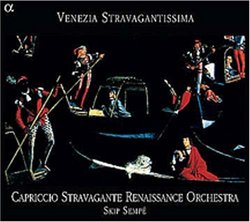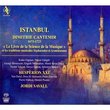| All Artists: Antonio Incerto, Giorgio Mainerio, Gioseffo Guami, Orazio Vecchi, Giovanni Picchi, Floriano Canali, Pietro Lappi, Gasparo Zanetti, Giovanni Gabrieli, Skip Sempe, Capriccio Stravagante, Guillemette Laurens Title: Venezia Stravagantissima Members Wishing: 0 Total Copies: 0 Label: ALPHA PRODUCTIONS Release Date: 7/20/2004 Genres: Special Interest, Pop, Classical Styles: Vocal Pop, Chamber Music, Historical Periods, Baroque (c.1600-1750), Classical (c.1770-1830) Number of Discs: 1 SwapaCD Credits: 1 UPC: 026724404924 |
Search - Antonio Incerto, Giorgio Mainerio, Gioseffo Guami :: Venezia Stravagantissima
 | Antonio Incerto, Giorgio Mainerio, Gioseffo Guami Venezia Stravagantissima Genres: Special Interest, Pop, Classical |
Larger Image |
CD DetailsSimilar CDs |
CD ReviewsExcellent performances but dubious musicology... Maddy Evil | London, UK | 07/23/2005 (4 out of 5 stars) "Judged solely on the strength of the performances, this recording by Capriccio Stravagante can generally be recommended without hesitation (see below for detailed track listing). The personnel line-up comprises many well-known exponents of early music (from groups such as Hesperion XXI, the Harp Consort, the Huelgas Ensemble and Le Poeme Harmonique) and the programme is an attractive compilation of late 16th and early 17th century Italian music. Incidentally, both in ensemble and programme, this recording is reminiscent of (and perhaps inspired by?) David Munrow's with the Early Music Consort of London entitled Two Renaissance Dance Bands; Monteverdi's Contemporaries (Testament SBT1080). Under Sempe's direction, the individual players of Capriccio Stravagante frequently exhibit incredible virtuosity - Doron Sherwin's cornett diminutions are particularly spectacular.
There are, however, two important reservations with this recording. Firstly, at just over 50 minutes in length, the duration is not exactly generous: in fact, given that the last track actually includes over 7 minutes of material from previous tracks (5, 7 and 1 respectively), the real length of the CD is barely 45 minutes, which seems somewhat penurious. Secondly, questions arise from the musicology presented in defence of the approach adopted here. In the liner notes (p.41), Sempe viciously attacks metric performances of Early Music, arguing that the 'allure' of much pre-Baroque repertoire resides in its close association with the doctrine of rhetoric and the imitation of speech. However, whilst this is undoubtedly true for the operas and madrigals of the period, its apparent relevance for the interpretation of dance music - i.e. functional (= metric) music conceived primarily for dancing (here Mainerio and Zanetti, etc.) - seems decidedly problematic, especially since Sempe provides no evidence to support his beliefs. Indeed, the only document which is actually cited in the notes - namely Thomas Croyat's description of musical celebrations at San Rocco in 1608 [published in 'Croyat's Crudities...', 1611, pp.251-3] - refers neither to the principle of rhetoric nor even really to the type of music performed here (with the exception of track 14, and perhaps tracks 3, 9 and 12), and furthermore, there is a decidely conspicuous difference between Capriccio Stravagante's ensemble and the one which is described by Croyat (4 cornetts, 10 trombones, 2 viola da gambas, 1 violin and 7 organists). In fact, even when the 'rhetoric' is applied to more appropriate music - such as Vecchi's 'Mostrav in ciel' (track 4) - it does not bring out the meaning of the [unsung] words anyway; instead, such pieces are merely treated as abstract 'instrumental' works. Given that Sempe's approach in all Early Music is 'rhetorical' in this sense - whether Cabezon, Lully or Bach - it is difficult to avoid concluding that his interpretations were motivated by aesthetic rather than musicological reasons. Such motivations would also seem to account for some of the choices of ensemble, which, whilst not necessarily 'wrong', are difficult to substantiate with evidence (Zanetti's 'Il Scolaro' [1645], for example, was primarily intended for violins rather than the mixed forces of strings and winds adopted here). Ultimately then, this CD must be assessed on aesthetic grounds. Taken as a whole, there is much to recommend and the most successful tracks place this recording alongside the best available renditions of Renaissance dance music, such as those of Pickett and Savall - just prepare yourself for some slightly awkward moments when the 'rhetoric' goes a bit overboard...! Tracks: 1. Pavan 'The Funerals' - Antonio Incerto (fl.1584-1602) 2. Pass'e mezzo Moderno - Giorgio Mainerio (1535-82) 3. Canzon Vigesimaquarta a 8 - Gioseffe Guami (1540-1611) 4. Mostrav' in ciel: Tedesca a 5 - Orazio Vecchi (1550-1605) 5. Tedesca e Saltarello - Mainerio 6. Pass'e mezzo Antico - Mainerio 7. Pass'e mezzo della Paganina e Saltarello - Mainerio 8. Ballo alla Polacha - Giovanni Picchi (fl.1600-25) 9. Canzona: La Balzana a 8 - Floriano Canale (1550-1603) 10. Gioite tutti in suoni: Saltarello detto il Vecchi - Vecchi 11. Ballo Anglese e Saltarello - Mainerio 12. Canzon Decimaottava a 8: La Negrona - Pietro Lappi (1575-1630) 13. Intrada del Marchese di Caravazzo - Gasparo Zanetti (fl.1626-45) 14. Canzon II - Giovanni Gabrieli (c.1555-1612) 15. Ballo Ongaro - Picchi 16. So ben mi ch'ha bon tempo - Vecchi + finale" |




